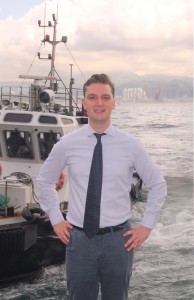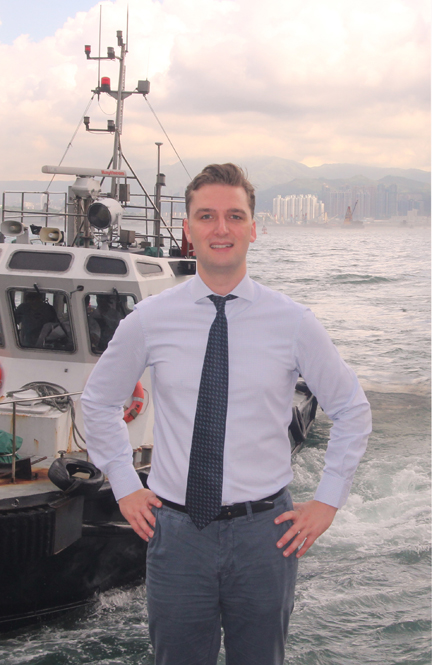
HONG KONG –– April 30, 2014 is a red-letter day for Konstantin Borek, a 22-year-old German chief executive who is out on a mission to make the global container shipping industry more transparent.
From the headquarters of Ocean Insights, which he founded in Hong Kong in August 2012, Borek has a commanding view of the entire industry from which his company expects to reap returns on its investment beginning next April.
The company was borne out of Borek’s frustration over a dearth of key information from shipping lines and data providers about traders’ concerns such as freight rates and ship departure and arrival dates. It initially offers three products: sailing schedules, cargo track and trace, and vessel on-time performance.
The CEO, who started his education in September 2009 at Hellmann Worldwide Logistics, where he studied transport and logistics management in addition to going to the GSIS Business College in Hong Kong, would not give a revenue target for his company this year.
“Revenue target? I can’t mention,” he replied when PortCalls asked him if he had one during a recent interview in a coffee shop in Hong Kong. “You just have to say we’re growing very fast and looking to a turnaround in April next year.”
The past year and a half has seen money going to capital expenditure as the start-up company built up its business.
“We have invested a lot of money in order to get this product ready, however, we are very close to being green, being profitable, and we are going with the task at the moment.
Ocean Insights operates on a lean and mean staffing of 20 people in four global locations — Hong Kong, site of the headquarters; Dublin, Ohio; Hamburg, Germany, and Ahmedabad, India.
The company staff comprises IT specialists, shipping analysts who, among other things, analyze data on shipping lines’ on-time performance, and sales executives who market the company’s services.
But the backbone of Ocean Insights’ operation is the army of 1,000 data sources embedded in shipping companies with access to real-time vessel and cargo information.
“We have 1,000 sources collecting data and they’re insiders in shipping lines, and every day we collect more than 15 million data sets,” Borek said when asked how the company is able to gather all the data that make up its business.
Complementing these data collectors are satellite tracking that helps pinpoint where a ship is at a particular time and satellite data that Ocean Insights’ shipping analysts use as extra data to analyze vessels’ on-time performance.
Today, Ocean Insights has 37 shipping lines in its shipping schedules product, which covers over 120,000 port-to-port connections, transshipments and feeder connections. Its track and trace service provides real-time updates on 59 shipping lines, while its on-time performance product keeps tabs on vessel movements of the 37 liner companies.
“We make the shipping industry much more transparent in terms of what’s available and in terms of how shipping lines are operating,” the CEO said.
Borek’s ultimate goal is to make slot-sharing among shipping lines more transparent for the benefit of customers. Slot-sharing is an industry practice wherein a carrier sells space on its vessel to, say, five other liners to save on bunker fuel.
What customers do not know is that their shipments are carried on one vessel by five different lines charging different rates and declaring different arrival times. By subscribing to Ocean Insights’ services, exporters and importers can now pick their best choice of liners in terms of arrival times.
“Our biggest differentiation in what we do here is we make slot-sharing agreements transparent. So, let’s say [German shipping line] Hapag Lloyd is offering its service from Asia to Europe. On this vessel they’re selling capacity to five shipping lines. At the end of the day, on this vessel you have six shipping lines offering the same service but at different rates. So, customers like Hellmann get different rates from the same vessel,” Borek explained.
“Instead of showing 120 services from Asia to Europe, we only show you 40 vessels that are actually leaving the piers. We therefore make the industry very transparent in terms of slot-sharing agreements,” Borek said.
Ocean Insights’ on-time performance product measures all global services of shipping lines and rates them according to the quality of service.
“If Hapag Lloyd says we arrive on the 27th and they arrive on the 29th, we analyze that. We then rate shipping lines globally on how good their services are in percentages,” Borek said.
All products provided by Ocean Insights are either accessed on its online platform, implemented in their customers system or raw data customized to the needs of individual clients. He said subscription to the services are priced on a monthly basis and depend on the product type.
Moving forward, Ocean Insights is planning to expand both its product offerings and global presence. Borek said the company is eyeing expansion in the US, which he described as a very big market being served by just one staff, as well as take its services to South America. “We are also going to Singapore next year and to other places in Asia,” he said, not to open offices but to talk to prospective customers.
China, however big a market it is, is not on Ocean Insights’ priority list.
“China is a very difficult market for us, a very big market but very special as well. You have to have Hong Kong shippers who are attached to local shippers. We don’t have any customers in China yet, but we definitely want to enter China in the future… we believe China is one of the biggest markets, but difficult to approach,” Borek said.
Currently, the company’s biggest markets are Germany, which accounts for about 50% of its business; the US, which makes up around 40%, and Asia, about 10%. “But hopefully it’s [Asia business that is] going to get more next year since we are focusing research on Hong Kong and Singapore,” Borek said.
Borek did not come across the idea of a global shipping data platform by accident.
He came to Hong Kong three and a half years ago to work – and study – at Hellmann Logistics, Germany’s largest freight forwarding company, where he was the assistant of Jens Pottschul, the vice-president for sea freight in Asia.
For his work he searched for companies that provided information about the market and shipping lines, and came up with two service providers. “But none of them were efficient, none of them had global coverage, they had different kinds of information put together, so I decided to put up my own business and that was when Ocean Insights was born,” Borek said. –– Vir B. Lumicao





